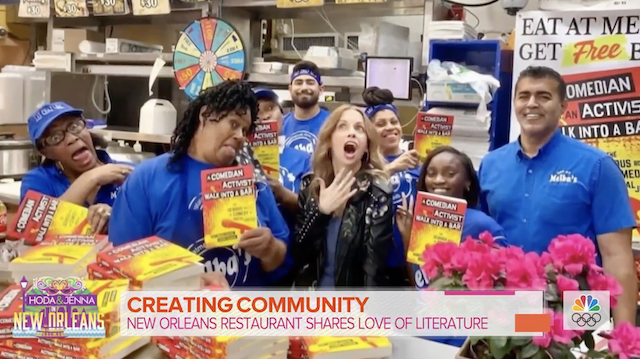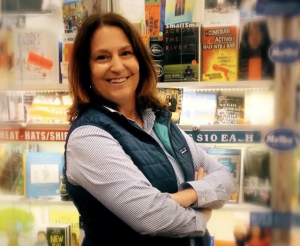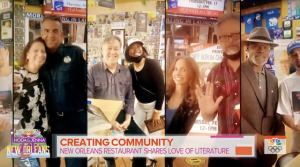
Invited to speak about her co-authored book, A Comedian and an Activist Walk into a Bar: The Serious Role of Comedy in Social Justice (2020, University of California Press), written with Lauren Feldman, CMSI Executive Director Caty Borum held a signing event at Melba’s, a New Orleans restaurant beloved not only for its Poboy sandwiches, but also for its soul-feeding community literacy program, Eat and Read at Melba’s.
Melba’s restaurant co-owner Jane Wolfe attended college later in life before earning her Master of Divinity degree from Harvard University at the age of fifty. She created Eat and Read at Melba’s in 2018 after finding herself awestruck by the vast world of knowledge she found in books during her undergraduate and graduate studies.
Eat and Read at Melba’s took off. Today, local and renowned authors alike, from Pulitzer Prize winner Colson Whitehead and cultural studies commentator Eddie S. Glaude Jr., Ph.D. to former U.S. Secretary of State Hillary Clinton hold book events at Melba’s. Wolfe’s literacy program has become so popular that the TODAY show recently featured her community-building efforts in its segment, Creating Community: New Orleans Restaurant Shares Love of Literature.
We reached out to Jane Wolfe to learn more about the inspiration behind her program and how she sees comedy and storytelling as forces for social change.
__________________________
You’ve talked about how reading has transformed your life and the lives of many people who come through Melba’s. How do you believe Eat and Read at Melba’s is helping to transform and contribute to your community?
Jane: My life was transformed by the books in college because the reading assignments were so enlightening. A Melba’s staff member once said, “These books are like attending a college semester!” With this comment, I realized that books are pushing people to think more deeply about things.
I remember giving away the book March: Book One by Congressman John Lewis, Andrew Aydin and Nate Powell and illustrated by cartoonist Nate Powell. Many people were amazed to discover the history of America’s civil rights told through the eyes of a cartoonist. I also saw the same wonder in people’s eyes to learn something new that I had when reading the Pulitzer Prize-winning graphic novel about the Holocaust, The Complete Maus: A Survivor’s Tale by Art Spiegelman, which a college professor had assigned to my classmates and me to read.
 What made you reach out to Caty Borum to talk about her book on comedy and social change?
What made you reach out to Caty Borum to talk about her book on comedy and social change?
Jane: I heard a wonderful talk by Caty at Chautauqua Institute and thought it would be beneficial for people to understand how comedy can be a force of social good and not just a force of laughter.
Many people see comedians on a superficial level as mere laughing machines, but I wanted people to think more deeply about how comedians have great power to move minds. I was amazed to learn about the power of comedians to address societal issues, and I knew Melba’s customers would be intrigued, too.
You’ve done several book tours including your appearance at Eat and Read at Melba’s – what struck you as unique about your experience there that stood out to you?
Caty: I really loved the sense of community and connection at Melba’s. Everyone who came in and worked there had a story to share with me and one another. As an author, it was also so interesting to learn what people think about the topic of comedy and social change in general, and to hear their stories about favorite comedians and their influences. I learned quite a bit of comedy history I didn’t know.
What’s the most gratifying change you’ve seen in your community since Read at Melba’s began?
Jane: The most gratifying change has been watching New Orleanians walk into our establishment with a look of pleasant surprise. I see people looking around with wonderment about what is going on in here!
You walk into a Po’ Boy shop for food. You walk into a laundromat to do your clothes. You walk into a daiquiri place to get a drink for a fun evening in the city. When you enter Melba’s, you get everything you came in for but more, when you’re immediately hit with aspects of literacy you were not expecting. Educators are especially delighted to walk into Melba’s. It is very gratifying to see people from academia walking into our business and singing its praises for what we’re doing to make reading fun.
Books are supposed to be sold via Amazon and bookstores. Melba’s literacy project has redefined where a book can engage with a person’s mind.
Can you share more about how the audience at your book signing engaged with the themes discussed in your book, A Comedian and An Activist Walk Into a Bar: The Serious Role of Comedy in Social Justice (co-authored with Lauren Feldman)?
Caty: Comedy touches all of us in some way, whether or not we think about it in that way. Everyone shared a story about a comedy TV show or comedian who resonated with them, or a story they never forgot. The lovely community at Melba’s was so friendly and generous in their idea exchange. It was a wonderful experience!
 What were some of your most memorable book events and why?
What were some of your most memorable book events and why?
Jane: Two book signings come to mind.
Of course, the very first one is memorable. I felt electricity in the air as Professor Jonathan Walton shared 100 copies of his book with surprised New Orleanians. People come into Melba’s for food, and getting a book from a Harvard Professor was a lagniappe. I remember customers telling me that this specific interaction was the first time in their life meeting anyone from Harvard University. From these comments, I realized that the Ivory Tower was disconnected from the public square more than I knew. Jonathan’s book signing allowed me to understand how Melba’s was in a perfect position to merge and engage the public with academia.
The religious scholars and professors have also been delightful! I read Professor Stephen Prothero’s books in my college class, World Religions, which my classmates and I loved, so I knew New Orleanians would enjoy it, too!
I pursued Stephen for an entire year to come to Melba’s for a book signing event and share his most relevant book, Religious Literacy. It’s this type of book – easy to read and packed full of basic knowledge – that is sorely needed by everyday people in the public square. When I finally secured him for an Eat and Read at Melba’s event, many of those attending were intrigued by his book and its title, saying, “I need this!”
Stephen expressed sheer delight talking with everyone at Melba’s. He apologized for taking so long to say “yes” because he could not believe how receptive and grateful people were to learn about his book, which is pivotal to everyday people understanding their fellow global neighbor. I’m happy I chased Stephen – it was worth it!
We saw on the TODAY show that Scholastic donated $5,000 worth of books to Eat and Read at Melba’s – what plans do you have if the popularity of Eat and Read at Melba’s grows beyond the walls of your store?
Jane: I’ve operated the literacy program for the last three-and-a-half years, and as of March, our Eat and Read literacy project is now a nonprofit organization.
I do not take this non-profit designation lightly. I’ve been in business with the general public these past 40 years, and I see this literacy project partnering with the food industry and publishing world to help America’s literacy problems at the most basic grassroots level.
Everybody needs to eat, and everybody should read to gain knowledge and, more importantly, to develop a habit of reading to bring comfort to their lives.
With the right literacy partners working together, I foresee the restaurant staff and its clientele being served by the publishing and academic world in ways they never thought possible.
Our Eat and Read program has already grown beyond the walls of Melba’s, as people are constantly asking me to bring the literacy project to their city or neighborhood. I’m working to keep up with it!
Thanks to Jane Wolfe for contributing to this post.
